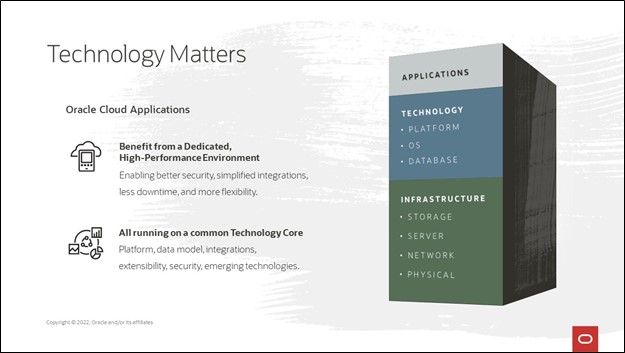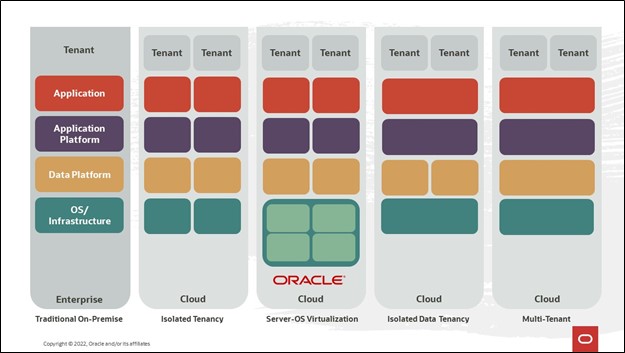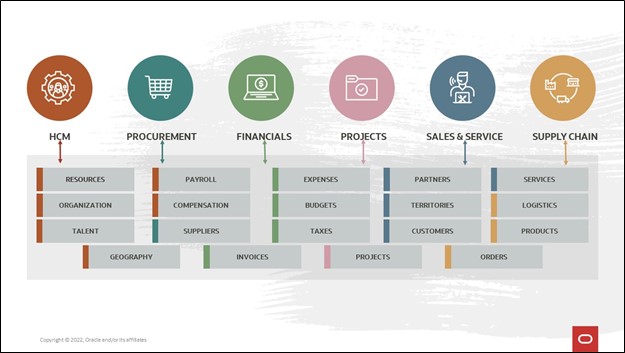If you are building a house, one of the first things you do is lay your foundation. For houses, that foundation is generally concrete and steel. The foundation should be strong, stable, and provide the required services for the house. The same is also true for software applications, they need a strong, stable foundation: underlying technologies, which allow data storage and processing, business logic, user interaction, configuration, and extensibility.
Taking this a step further, a strong technical foundation matters not only because it enables the applications, but because it can itself also trigger and enable business change. Technology can facilitate a business process change (a new workflow) or provide new insights into operational conditions through AI/ML.
For example, by using a Digital Assistant to field inquiries for Human Capital Management (HCM) information, you can change many activities to self-service: introducing efficiencies, reducing workload, and improving responsiveness. Technologies such as AI/ML (Artificial Intelligence/Machine Learning), Blockchain and IoT (Internet of Things) can provide you with some of the competitive differentiation required to break into new markets or even stay in existing ones.
How quickly can your existing back-office systems adapt to change? How quickly can they help you adopt new technologies? If the answer to either of these is “slowly”, it is likely that your underlying technology foundation/platform is holding you back. This engagement delay is at the core of why technology matters and why the Oracle Applications Platform is crucial to the on-going success of our customers.
A Foundation for Velocity and Agility
With Oracle Cloud Applications, customers are always on the current release of the software. No more waiting years for an upgrade to enable new functionality. The quarterly release schedule for Oracle Fusion Applications means that new functionality and emerging technology can be onboarded at the pace of business, not at the pace of upgrades. One of the lessons from the global pandemic is how fast things change: one day we are working in the office, the next, we found ourselves working remotely and global supply chains torn asunder. Oracle Cloud Applications helped our customers pivot and change as the world was changing.
Velocity and agility matters – adapt and adapt quickly.
A Foundation for Flexibility
Oracle Cloud Applications are flexible and configurable to match your business—not the other way around.
- Configure applications screens to include new fields as part of your business processes without recoding or customizing your applications.
- Implement robust security that models your operations with granular Role Based Access Control.
- A unified data model simplifies deployment and reporting.
- Personalize the system to match your corporate look and feel.
- Extend your cloud applications functionality and processes using the Oracle Applications Platform.
All of these (and more) are enabled through Oracle Cloud Applications Platform.
Flexibility matters—configure your applications, not your business.
A Foundation for Security
There IS such a thing as bad publicity.
No-one wants to be the subject of a headline announcing a security breach. You don’t and neither does Oracle. Over the years, Oracle has developed a broad and deep set of security standards and practices. Oracle’s security practices are multidimensional, encompassing how the company develops and manages enterprise systems, and cloud and on-premises products and services. One security practice, Oracle’s Software Security Assurance, is Oracle’s methodology for building security into the design, build, testing, and maintenance of its products, whether they are used on premises by customers, or delivered through Oracle Cloud with Oracle being responsible for a substantial part of security. We designed Oracle Cloud Security with a security-first mindset, and the security capabilities help build a strong foundation for the Oracle Applications running on OCI. The Oracle security architecture, along with the security services, helps customers to secure their data and applications.
Security matters—understand the world is not always a nice place.
An Investment in the Future
Oracle invests billions of dollars each year in research and development and has been doing so for many years. Conversely, companies that do not invest in new technologies and in themselves can fall by the wayside.
Oracle Cloud Applications continue to innovate by introducing AI/ML, Digital Assistants, Block Chain, Micro-services, Advanced Analytics, continuous security improvements and more. By always being on the current release of software—our customers can adopt these innovations faster.
Innovation matters—don’t stand still.
A Platform for the Future
Oracle Fusion Applications are unique in many respects. One of them is the fact that it is deployed on an Oracle technology stack:
- Oracle Servers
- Oracle Storage
- Oracle Operating System (Linux)
- Oracle Virtualization
- Oracle Database
- Oracle Fusion Middleware and Application Server
- Oracle Applications

For more information, please refer to the Oracle Cloud Security Blog: Security Advantages of the Oracle Stack.
The traditional model of non-Oracle cloud application deployment makes use of a multitenant architecture where multiple customers share the same database and program files. Isolation is effectively provided through data striping. While this represents obvious cost savings for the vendor, this model provides few tangible engineering benefits for the customer. The diagram below shows the major variants found for cloud tenancy from the traditional on-premises deployment, through to legacy multitenant, and to Oracle’s own isolated tenancy. The approach taken by Oracle for many of its SaaS Cloud Applications is shown in the third column of the diagram.

Oracle has deliberately broken this tradition because we believe customers deserve their own environment. We offer a virtualized isolated tenancy deployment where customers each have their own:
- Database
- Virtualized Middle Tier
There is no co-mingling of data among customers, which is just one way Oracle helps secure your data. This provides multiple benefits including the ability to provide private encryption keys, deeper configuration capabilities, and minimization of the “noisy neighbor” effect found in some conventional multitenant architectures.
As well as the security architecture—the Oracle Cloud provides better reliability, manageability, support, and security because Oracle develops, enhances, and controls every aspect.
A technology platform matters—drive consistency.
A Foundation for Integration
Integration is arguably the most significant source of complexity and risk within enterprise architectures. Deploying enterprise cloud solutions within a global single instance reduces the need to build and maintain integrations across the enterprise.
Oracle Fusion Cloud Applications come with processes that are based on best practices and a shared data model that aligns business objects between your mission-critical business applications.

Business processes can be automated because the underlying data model uses shared data structures across modules.
Organizations typically have a recurring need for the streamlined management of inbound and outbound data flows in areas such as initial data conversion, master data creation and maintenance, regular transaction processing, and fiduciary compliance. Oracle Cloud Applications offer a comprehensive collection of built-in tools and feature sets to meet these requirements. Integration scenarios involve system-to-system integration flows between distinct on-premises systems, third-party or legacy systems, and cloud systems. The suite of web services and APIs provided by Oracle Cloud Applications simplifies the building of enterprise integrations by providing granular access to the underlying business objects.
As well as providing an internally integrated system and a comprehensive suite of inbound and outbound REST APIs, Oracle provides integration recipes to facilitate common integrations by acting as a starting point.
Connectedness matters—unlock the potential of connected data.
A Proven Technology Foundation
Technology is what enables your business to thrive. With Oracle, you are positioned for innovation, agility, and to be the best in your industry. Simply put, Oracle:
- Provides a platform that can both adapt and do it quickly.
- Allows an application to be configured to your business—not the other way around.
- Provides security to help you secure your data and applications: How Oracle SaaS Protects your Data
- Introduces and enables new ways of doing things through emerging technologies such as digital assistants.
- Creates a reliable platform for operations and growth.
These factors together form the cornerstone of Oracle Cloud Applications while positioning Oracle customers for on-going success. By leveraging Oracle Cloud Applications powered by Oracle Cloud Infrastructure, customers receive a comprehensive, future proof, and cutting-edge solution that enables customers and organizations to excel in their industries.
Please let us know how Oracle can help you at any step in your Oracle Applications journey. Come back soon for future posts in this series on Why Technology Matters for Oracle Cloud Applications.
Visit the Oracle Cloud Applications and OCI page and read The IT & Business Leader’s Guide to Oracle Cloud Applications ebook for more information.
Access the first blog in the series here – Oracle Cloud Applications: Technology Matters – Introduction.
The author is a member of Oracle’s North American Applications Advanced Technology team, dedicated to helping customers modernize their businesses through technical innovation. He provides subject matter expertise and vision on SaaS, platform technology, operations, and data management.
